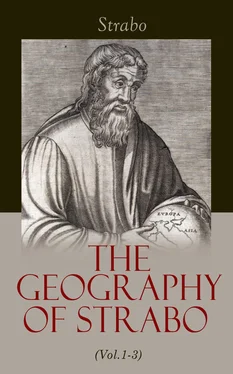Strabo - The Geography of Strabo (Vol.1-3)
Здесь есть возможность читать онлайн «Strabo - The Geography of Strabo (Vol.1-3)» — ознакомительный отрывок электронной книги совершенно бесплатно, а после прочтения отрывка купить полную версию. В некоторых случаях можно слушать аудио, скачать через торрент в формате fb2 и присутствует краткое содержание. Жанр: unrecognised, на английском языке. Описание произведения, (предисловие) а так же отзывы посетителей доступны на портале библиотеки ЛибКат.
- Название:The Geography of Strabo (Vol.1-3)
- Автор:
- Жанр:
- Год:неизвестен
- ISBN:нет данных
- Рейтинг книги:3 / 5. Голосов: 1
-
Избранное:Добавить в избранное
- Отзывы:
-
Ваша оценка:
- 60
- 1
- 2
- 3
- 4
- 5
The Geography of Strabo (Vol.1-3): краткое содержание, описание и аннотация
Предлагаем к чтению аннотацию, описание, краткое содержание или предисловие (зависит от того, что написал сам автор книги «The Geography of Strabo (Vol.1-3)»). Если вы не нашли необходимую информацию о книге — напишите в комментариях, мы постараемся отыскать её.
The Geography of Strabo (Vol.1-3) — читать онлайн ознакомительный отрывок
Ниже представлен текст книги, разбитый по страницам. Система сохранения места последней прочитанной страницы, позволяет с удобством читать онлайн бесплатно книгу «The Geography of Strabo (Vol.1-3)», без необходимости каждый раз заново искать на чём Вы остановились. Поставьте закладку, и сможете в любой момент перейти на страницу, на которой закончили чтение.
Интервал:
Закладка:
“The dwellers on the rocks
Of Aulis follow’d, with the hardy clans
Of Hyria, Schœnus, Scolus.” 58
To us this is of value, while to be acquainted with the Indies and their various territorial divisions would be useless, as it could lead to no advantage, which is the only criterion of the worth of such knowledge.
17. Even if we descend to the consideration of such trivial matters as hunting, the case is still the same; for he will be most successful in the chase who is acquainted with the size and nature of the wood, and one familiar with the locality will be the most competent to superintend an encampment, an ambush, or a march. But it is in great undertakings that the truth shines out in all its brilliancy, for here, while the success resulting from knowledge is grand, the consequences of ignorance are disastrous. The fleet of Agamemnon, for instance, ravaging Mysia, as if it had been the Trojan territory, was compelled to a shameful retreat. Likewise the Persians and Libyans, 59supposing certain straits to be impassable, were very near falling into great perils, and have left behind them memorials of their ignorance; the former a monument to Salganeus on the Euripus, near Chalcis, whom the Persians slew, for, as they thought, falsely conducting their fleet from the Gulf of Malea 60to the Euripus; and the latter to the memory of Pelorus, who was executed on a like occasion. At the time of the expedition of Xerxes, the coasts of Greece were covered with wrecks, and the emigrations from Æolia and Ionia furnish numerous instances of the same calamity. On the other hand, matters have come to a prosperous termination, when judiciously directed by a knowledge of the locality. Thus it was at the pass of Thermopylæ that Ephialtes is reported to have pointed out to the Persians a pathway over the mountains, and so placed the band of Leonidas at their mercy, and opened to the Barbarians a passage into Pylæ. But passing over ancient occurrences, we think that the late expeditions of the Romans against the Parthians furnish an excellent example, where, as in those against the Germans and Kelts, the Barbarians, taking advantage of their situation, [carried on the war] in marshes, woods, and pathless deserts, deceiving the ignorant enemy as to the position of different places, and concealing the roads, and the means of obtaining food and necessaries.
18. As we have said, this science has an especial reference to the occupations and requirements of statesmen, with whom also political and ethical philosophy is mainly concerned; and here is an evidence. We distinguish the different kinds of civil government by the office of their chief men, denominating one government a monarchy, or kingdom, another an aristocracy, a third a democracy; for so many we consider are the forms of government, and we designate them by these names, because from them they derive their primary characteristic. For the laws which emanate from the sovereign, from the aristocracy, and from the people all are different. The law is in fact a type of the form of government. It is on this account that some define right to be the interest of the strongest. If, therefore, political philosophy is advantageous to the ruler, and geography in the actual government of the country, this latter seems to possess some little superiority. This superiority is most observable in real service.
19. But even the theoretical portion of geography is by no means contemptible. On the one hand, it embraces the arts, mathematics, and natural science; on the other, history and fable. Not that this latter can have any distinct advantage: for instance, if any one should relate to us the wanderings of Ulysses, Menelaus, and Jason, he would not seem to have added directly to our fund of practical knowledge thereby, (which is the only thing men of the world are interested in,) unless he should convey useful examples of what those wanderers were compelled to suffer, and at the same time afford matter of rational amusement to those who interest themselves in the places which gave birth to such fables. Practical men interest themselves in these pursuits, since they are at once commendable, and afford them pleasure; but yet not to any great extent. In this class, too, will be found those whose main object in life is pleasure and respectability: but these by no means constitute the majority of mankind, who naturally prefer that which holds out some direct advantage. The geographer should therefore chiefly devote himself to what is practically important. He should follow the same rule in regard to history and the mathematics, selecting always that which is most useful, most intelligible, and most authentic.
20. Geometry and astronomy, as we before remarked, seem absolutely indispensable in this science. This, in fact, is evident, that without some such assistance, it would be impossible to be accurately acquainted with the configuration of the earth; its climata, 61dimensions, and the like information.
As the size of the earth has been demonstrated by other writers, we shall here take for granted and receive as accurate what they have advanced. We shall also assume that the earth is spheroidal, that its surface is likewise spheroidal, and above all, that bodies have a tendency towards its centre, which latter point is clear to the perception of the most average understanding. However we may show summarily that the earth is spheroidal, from the consideration that all things however distant tend to its centre, and that every body is attracted towards its centre of gravity; this is more distinctly proved from observations of the sea and sky, for here the evidence of the senses, and common observation, is alone requisite. The convexity of the sea is a further proof of this to those who have sailed; for they cannot perceive lights at a distance when placed at the same level as their eyes, but if raised on high, they at once become perceptible to vision, though at the same time further removed. So, when the eye is raised, it sees what before was utterly imperceptible. Homer speaks of this when he says,
Lifted up on the vast wave he quickly beheld afar. 62
Sailors, as they approach their destination, behold the shore continually raising itself to their view; and objects which had at first seemed low, begin to elevate themselves. Our gnomons, also, are, among other things, evidence of the revolution of the heavenly bodies; and common sense at once shows us, that if the depth of the earth were infinite, 63such a revolution could not take place.
Every information respecting the climata 64is contained in the “Treatises on Positions.” 65
21. Now there are some facts which we take to be established, viz. those with which every politician and general should be familiar. For on no account should they be so uninformed as to the heavens and the position of the earth, 66that when they are in strange countries, where some of the heavenly phenomena wear a different aspect to what they have been accustomed, they should be in a consternation, and exclaim,
“Neither west
Know we, nor east, where rises or where sets
The all-enlightening sun.” 67
Still, we do not expect that they should be such thorough masters of the subject as to know what stars rise and set together for the different quarters of the earth; those which have the same meridian line, the elevation of the poles, the signs which are in the zenith, with all the various phenomena which differ as well in appearance as reality with the variations of the horizon and arctic circle. With some of these matters, unless as philosophical pursuits, they should not burden themselves at all; others they must take for granted without searching into their causes. This must be left to the care of the philosopher; the statesman can have no leisure, or very little, for such pursuits. Those who, through carelessness and ignorance, are not familiar with the globe and the circles traced upon it, some parallel to each other, some at right angles to the former, others, again, in an oblique direction; nor yet with the position of the tropics, equator, and zodiac, (that circle through which the sun travels in his course, and by which we reckon the changes of season and the winds,) such persons we caution against the perusal of our work. For if a man is neither properly acquainted with these things, nor with the variations of the horizon and arctic circle, and such similar elements of mathematics, how can he comprehend the matters treated of here? So for one who does not know a right line from a curve, nor yet a circle, nor a plane or spherical surface, nor the seven stars in the firmament composing the Great Bear, and such like, our work is entirely useless, at least for the present. Unless he first acquires such information, he is utterly incompetent to the study of geography. *So those who have written the works entitled “On Ports,” and “Voyages Around the World,” have performed their task imperfectly, since they have omitted to supply the requisite information from mathematics and astronomy.* 68
Читать дальшеИнтервал:
Закладка:
Похожие книги на «The Geography of Strabo (Vol.1-3)»
Представляем Вашему вниманию похожие книги на «The Geography of Strabo (Vol.1-3)» списком для выбора. Мы отобрали схожую по названию и смыслу литературу в надежде предоставить читателям больше вариантов отыскать новые, интересные, ещё непрочитанные произведения.
Обсуждение, отзывы о книге «The Geography of Strabo (Vol.1-3)» и просто собственные мнения читателей. Оставьте ваши комментарии, напишите, что Вы думаете о произведении, его смысле или главных героях. Укажите что конкретно понравилось, а что нет, и почему Вы так считаете.












![Anne Blunt - A Pilgrimage to Nejd, the Cradle of the Arab Race. Vol. 2 [of 2]](/books/750183/anne-blunt-a-pilgrimage-to-nejd-the-cradle-of-the-thumb.webp)